The conference heard a report from the Board of Directors on the evaluation of the results of the tasks performed in the 2020-2021 school year and the direction and tasks for the 2021-2022 school year. Accordingly, in the 2020-2021 school year, although there were some limitations and shortcomings, due to both subjective and objective reasons, the school generally completed the planned targets.
The university's admissions process remained stable. The university recruited 1,850 students for 31 majors/training programs, including successfully enrolling students in 4 high-quality socialized programs in accordance with Circular 23 of the Ministry of Education and Training. Despite the severe impact of the Covid-19 pandemic, thanks to timely adjustments and the strengthening of online admissions counseling and communication, the total number of applications for admission to the university's majors in 2020 was 34,942; the number of applications for first, second, and third choices reached 62% of the total applications. Overall within the Vietnam National University, Hanoi (VNU), the university had the largest number of applications, accounting for over 27% of the total applications and over 34.9% of the first-choice applications of the entire VNU. In addition, Master's program enrollment reached 98.5% of the target, and Doctoral program enrollment reached 108% of the target.
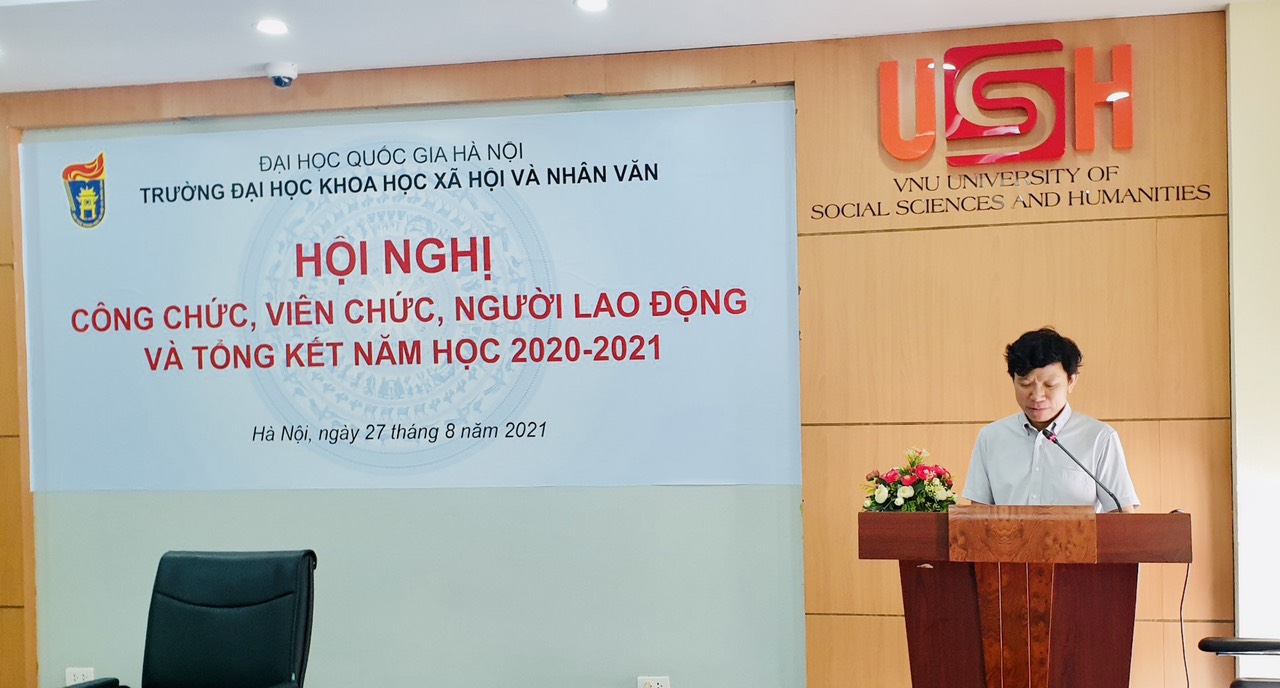
Professor Hoang Anh Tuan - Rector of the University, delivered the opening speech at the Conference.
Regular university training activities have been standardized and are increasingly improving in efficiency, as evidenced by: Standardized and digitized management and organization of training data in a transparent and open manner; The application of information technology in teaching and learning activities has yielded practical results, with approximately 1,800 course modules taught online in the 2020-2021 academic year; Flexible and rational teaching and learning plans have facilitated lecturers and students, improving the efficient use of facilities and lecture halls… In the past academic year, the University completed the development of one Master's program in Office Management with an applied orientation; and completedProposal for registration to participate in domestic doctoral training programs funded by the state budget.According to Decision No. 89/QD-TTg dated January 18, 2019 of the Prime Minister and approved by the Ministry of Education and Training, 12 out of 19 doctoral training programs have been completed;Planning scheme for majors and specializations of the University of Social Sciences and Humanities for the period 2020-2025.
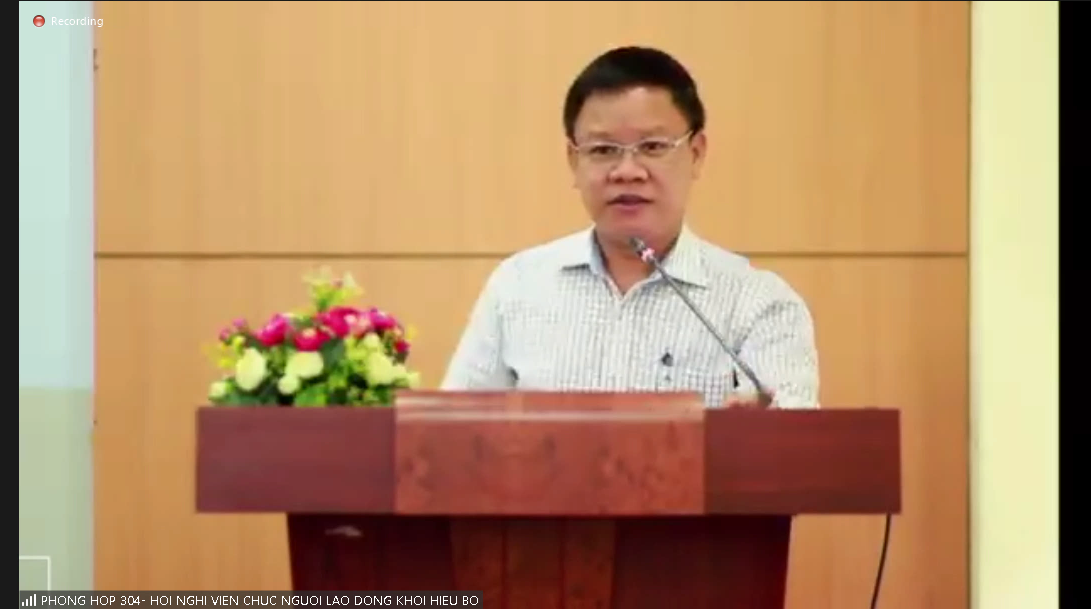
Associate Professor Dr. Lai Quoc Khanh - Vice Rector of the University, presented the report evaluating the results of the tasks performed in the 2020-2021 academic year and the direction and tasks for the 2021-2022 academic year.
Regarding scientific activities, the University successfully organized 15 scientific workshops/conferences, including 12 international scientific workshops. These workshops and seminars have been significantly reformed to better align with international publications and policy advice. The University continues to maintain close and regular relationships with key national-level scientific programs, as well as with the Ministry of Science and Technology and the National Foundation for Science and Technology Development (NAFOSTED), to promptly participate in proposing, developing proposals, and organizing the implementation of large-scale, interdisciplinary research projects, serving both scientific research objectives and policy advice for Vietnam. In the 2020-2021 academic year, the University is leading and implementing 6 component projects under the National Geographic Encyclopedia of Vietnam; 13 national-level projects, 14 Nafosted projects, 34 VNU-level projects, and 44 institutional-level projects.
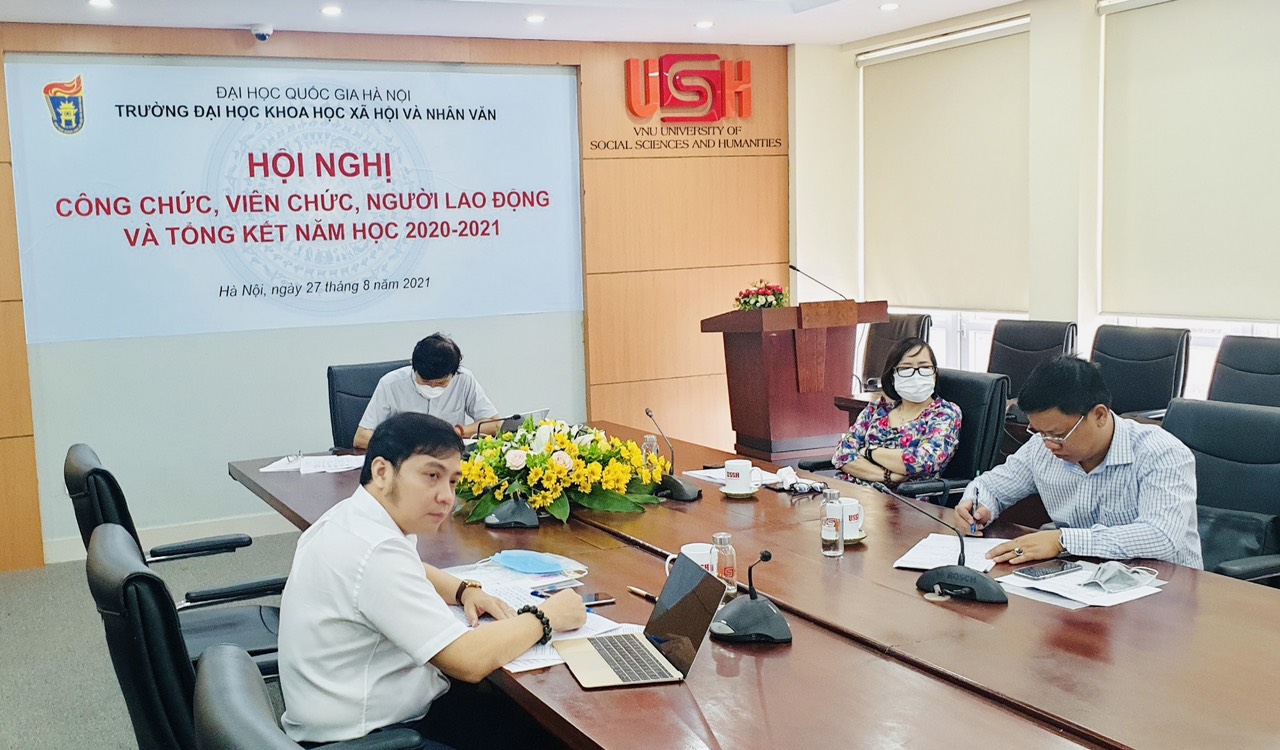
In the 2020-2021 academic year, the school's staff published 15 monographs and textbooks, including 2 monographs published in English; 380 research papers in scientific journals listed in the State Council for Professor Titles; and 148 articles in international scientific journals, including 56 articles in journals listed in the ISI/Scopus database and book chapters published by reputable international publishers.
In the field of development cooperation, the University signed and renewed 18 cooperation agreements with international partners. International cooperation programs and projects were implemented effectively.
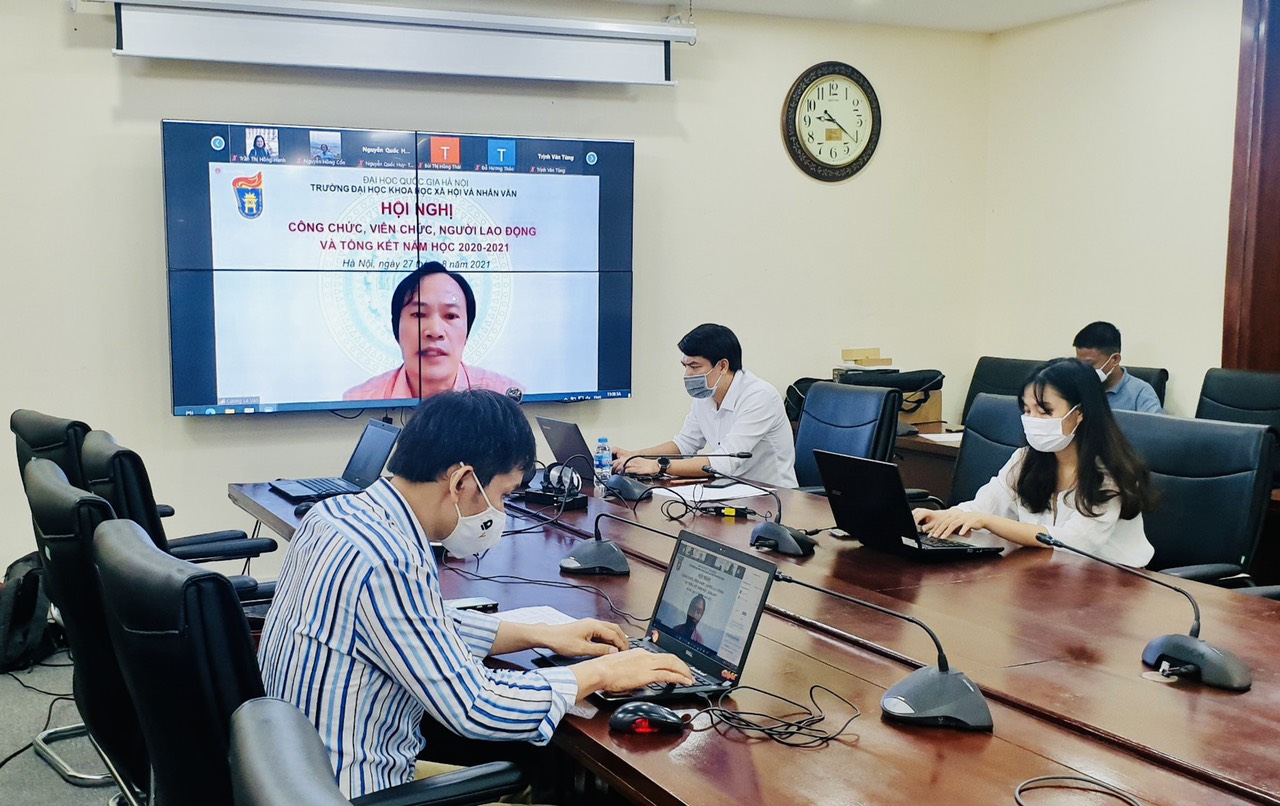
The conference listened to Comrade Le Van Cuong's report on the activities of the People's Inspection Committee over the past year.
Quality assurance in training has also made significant progress, with 6 undergraduate programs receiving quality assessments: The Bachelor of Political Science program was assessed online according to AUN-QA standards, achieving the AUN-QA quality standard; the Bachelor of Social Work, Management Science, Public Relations, Hotel Management, and Office Management programs were peer-reviewed by Vietnam National University, Hanoi, according to AUN-QA standards, achieving the quality standard. The university has also completed the development of a plan for evaluating and accrediting the quality of undergraduate and postgraduate programs for the period 2021-2025.
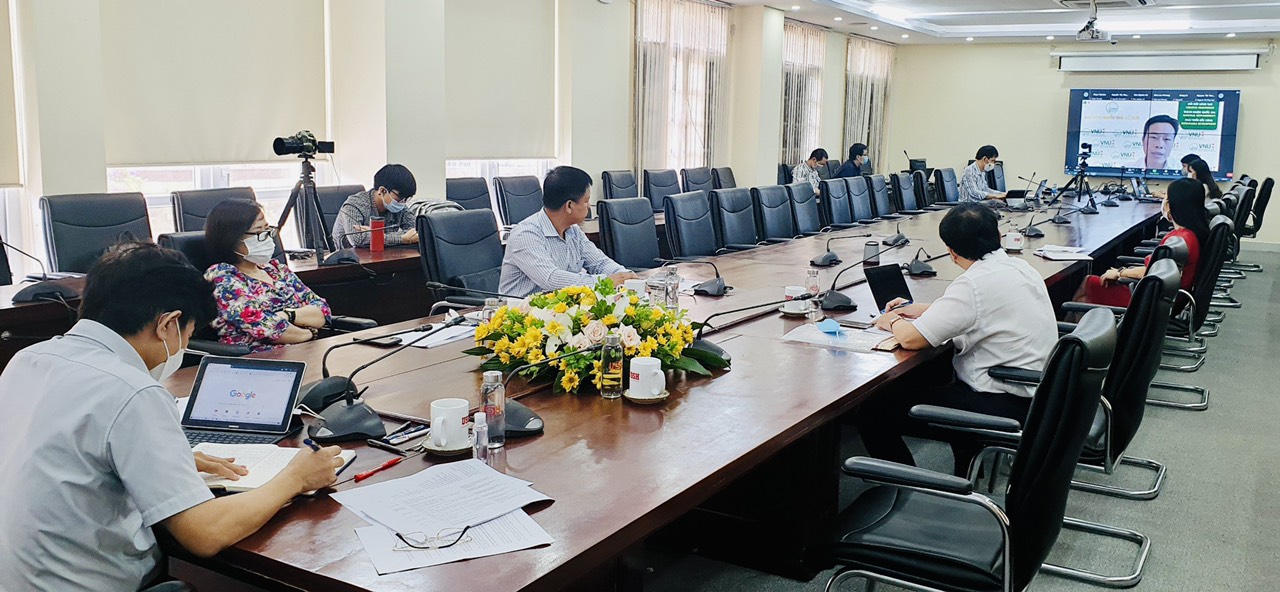
Speaking at the conference, the Director of Vietnam National University, Hanoi, Le Quan, highly appreciated the results achieved by the University of Social Sciences and Humanities during the academic year, and emphasized several tasks that the University needs to focus on in order to achieve new developments in the future.
Firstly, the University needs flexible policies and mechanisms to effectively utilize and leverage its team of reputable experts and scientists, many of whom, even after retirement, continue to make valuable contributions to the university and society. In addition, the University should focus on creating favorable financial mechanisms and working environments for young, successor staff members so they can develop their roles. A high-quality staff is key to the University of Social Sciences and Humanities' role as a pillar in areas such as policy consulting, philosophy building, and the development of ideological foundations.
Secondly, improving the quality of training must always be at the center of all policy decisions. For an institution focused on basic sciences, the goal of training elites cannot be overlooked. Ensuring training quality requires attention to standards regarding output, input, and the employability of graduates. Projects to innovate basic science disciplines and traditional faculties need to be prioritized, with a selection of faculties with the potential for breakthroughs and widespread impact being chosen for pilot investment during the 2021-2025 period.
Thirdly, attention should be paid to strengthening the mechanism of financial autonomy and university governance. A more flexible and "softer" autonomous structure could be considered, with programs, projects, and initiatives designed to utilize talented external personnel. Individuals wishing to develop innovative programs and ideas could be provided with mechanisms and financial support to do so. Certain units within the university could be selected for a high degree of autonomy, with the university creating space for their development.
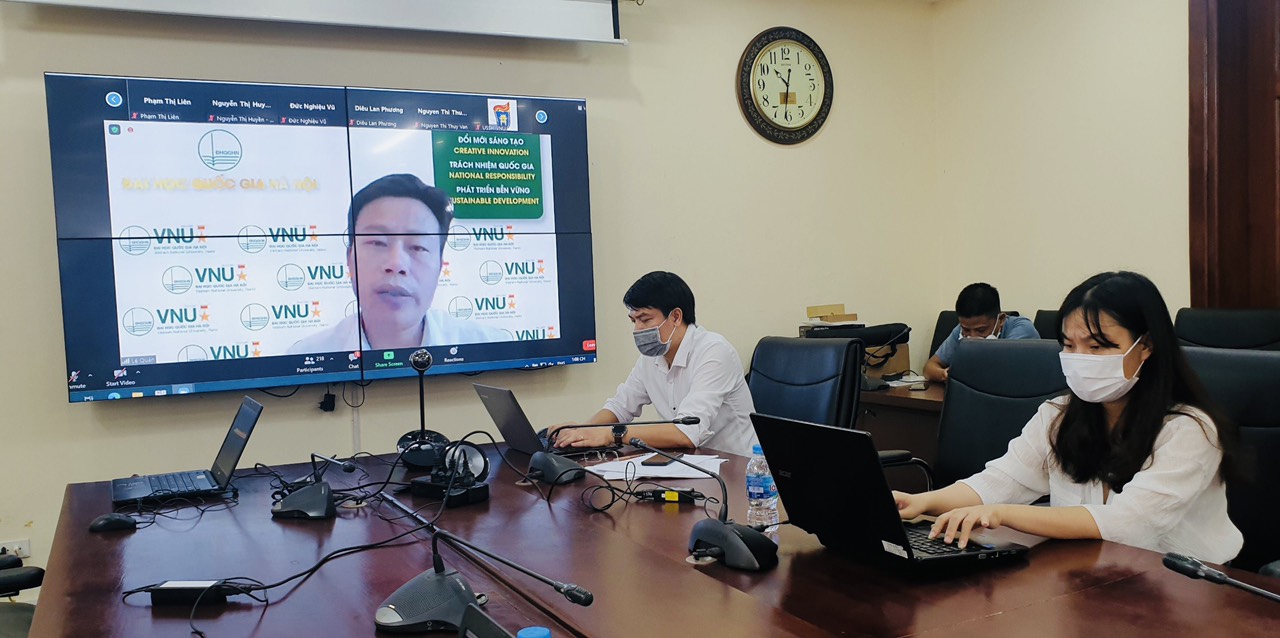
Director of Vietnam National University, Hanoi, Le Quan, delivered a speech at the Conference.
The Director of Vietnam National University, Hanoi (VNU), Le Quan, also affirmed that the role of the University of Social Sciences and Humanities is very important in VNU's key tasks related to digital transformation. Many courses will be implemented on digital platforms, and VNU will invest in a synchronized information technology infrastructure for this task. In 2022, approximately 20-30 common courses will be taught on this system for the entire VNU, combining 70% self-study on the system and 30% direct teaching. VNU also hopes that lecturers from the University of Social Sciences and Humanities will contribute their maximum capabilities in introducing common courses on Vietnamese culture, human ethics, and fundamental social sciences and humanities subjects as elective courses for students. Students both within and outside VNU can register for these courses and receive credit recognition.
Responding to the directives from the leaders of Vietnam National University, Hanoi (VNU), Professor Hoang Anh Tuan, Rector, affirmed: The university is committed to investing in the development of a high-quality, elite staff, both in quantity and quality, especially aiming for the standardization of academic titles and degrees. Regarding scientific work, the university will focus on targeted investment to develop more research projects, alongside national key science and technology programs, and also aim for international publications to create breakthroughs. Regarding training, the spirit of elite training will be thoroughly implemented. Concerning VNU's directives on training according to new models, the university has begun discussions with several units to develop proposals for submission to VNU. Suggestions on restructuring and increasing the autonomy of units will also be considered and implemented. With the operational plans for the new year, and with the guidance and support of VNU, the university is determined to continue maintaining stability and development, making worthy contributions as a key member of VNU.
Author:Thanh Ha
Newer news
Older news